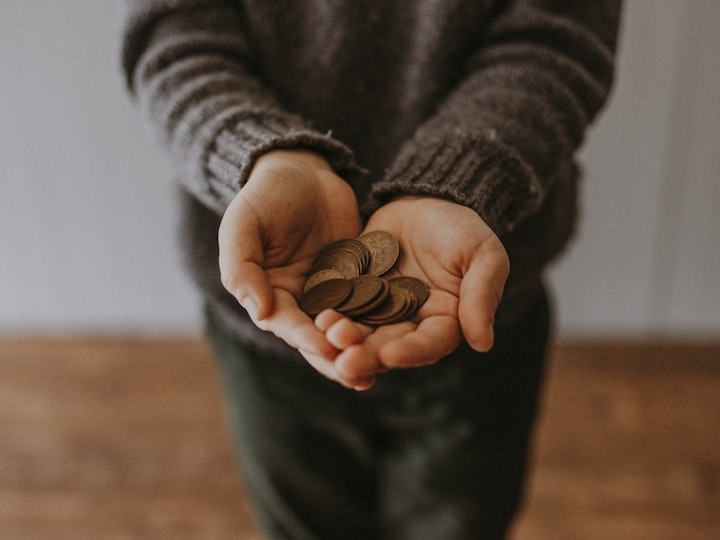Money-Saving Guide For Parents
Thoughts on breaking shame and getting practical for parents on a tight budget

First, beat up shame and become persistently practical.
Then eat healthy for less and save tiny amounts.
Share.
Find and forage wild food.
Get free food. And finally, get help!
1 Beat Up Shame
Let's be honest that struggling to provide for your children is one of the toughest situations parents face. For some, it's having enough for three meals a day. For others, it's paying for another round of ballet lessons. But the shame attached to one situation is as real as the other.
Shame grows from the belief (knowingly or not) that you or what you've done isn't enough. And there may be truth within that. Maybe you could have done more to save or earned more money or not taken out that loan or credit card and you could have bought less MacDonald's or coffees or fags or bought a Toyota rather than a Tesla.
Yet we are now in this position and we must forsake retrospective self-loathing and move toward action. Shame makes us to stop and stare at ourselves for a very long time. I promise you the outcome is dreary.
Look elsewhere. Look up! Look at your children and what they are learning from you in this moment. Maybe you are poor because of choices that could have been different but maybe not. Maybe you work forty hours a week, play it safe and still there's just not enough money to cover basic living.
And then your car broke down and now you have a bill for 500 bucks.
That is life, and it's probably not your fault. But if it is, forgive yourself and move forward.
2 Be Persistently Practical
Be careful not to slump into a self-analytical slumber. Instead lean consistently into the question, what CAN I do?
It's way too easy when you're struggling with money to allow a restriction mindset to take over. This is when all you can think about is the problem you are facing and how overwhelming it feels and how impossible it will ever be to find a solution. Very quickly you end up feeling like, and becoming, a victim.
Run away from this way of thinking!
Getting practical is the antidote. If you're frozen with fear, write a list. What do you already have; and what can you already do? It doesn't have to be about making or saving money. It could just be an action you can take like walking to the park with your children; calling a family member; writing a letter; making a pan of soup; getting some exercise or; setting a new (and achievable) goal that doesn't rely on money.
3 Eat Healthy For Less
We've used Save With Jamie as a starting point for ideas but adapted the recipes to fit our budget. These are our top takeaways and family ideas:
- Frozen spinach - (super cheap super food, easy to store). Add to a tomato sauce or soup or white (milk) sauce to go with pasta rice or potatoes.
- Bulk potatoes and rice - two of the cheapest unprocessed carbs. If you can scrape together £12, that could get you a 25kg sack of local potatoes. Basics rice from a supermarket is also very cheap - under £1 for a kilogram, which will serve ten generous portions.
- Oats for breakfast. Forget processed cereals. They are expensive, usually full of sugar and don't nourish your body. Incredibly, oats are far cheaper and have unbelievable benefits for your body, especially when soaked overnight. Here's a great recipe for how to prepare them and you don't need to add all the extras - just follow the process. Cook, serve and add honey or brown mashed-up bananas which you found reduced at the market.
- Reduced section for fresh veg - Sunday afternoons or other times just before a store closes is often a good time to look in the reduced section. There will probably be a random mix of stir fry vegetables, brown broccoli and some exotic fruits. Buy what others can't be bothered to prepare. The other option for fresh fruit and veg is free from community larders or food share points, but more on this later.
- Some basics for flavouring - reduced ready meals or instant soups are tempting but won't get you far. For the same price of a ready meal you could buy a bulb of garlic and a jar of mustard that will flavour and transform ten+ family meals. Other value basis that transform your carbs and veg: salt, pepper, cider vinegar, chili flakes, lemons, tomato puree, dried mixed herbs, dried Parmesan.
- Bacon off-cuts - Get a kilogram of bacon off-cuts (also called 'mishaps' or 'cooking bacon') for less than £2 from Lidl or other large supermarkets. Dice and fry with onion. Add to soup. Make bacon sarnies with bread from your food bank.
- Soup - Buy a used stick blender off eBay or from your local charity / thrift store. If you can't afford that, borrow one from a neighbour and spend a day making soup with that bacon and those reduced vegetables. Potatoes are a great base for a value soup - add garlic, a stock cube, a handful of bacon and some root vegetables and cover with water.
- Chicken carcasses - very cheap or free from your local butcher. Cram several into your largest pan, cover with water and bring to the boil. Simmer for at least two hours. The stock from these is FULL of protein, minerals and all sorts of goodness. Use as a base for your soups, stews or cook your rice with it.
4 Save Tiny Amounts
Defiantly save small amounts even when it seems like you cannot.
Save an amount small enough that you don't notice. Note: we're not trying to save for a new car or house or university for the kids. This is about becoming familiar with the practice of saving. If you can save consistently when things are tough, you're onto a winner when things are flush.
Do not think about it long and hard; take a small action and move on to the next thing, like making a meal out of free vegetables.
Start here: download the Plum app and save automatically or search more options here: Automatic saving apps.
5 Share
In his book Money, Sex and Power, Richard Foster, Quaker and theologian, writes:
We need to find ways to shout 'no' to the god of money. We need to dethrone it... So step on it. Yell at it. Laugh at it. List it way down the scale of values. And engage in the most profane act of all - give it away.
And I agree.
Here's a tip: look at what you have to give. A front room? A garden? A travel mug of coffee? A vegetable stew? A dollar for a homeless man? A homemade soup frozen and packaged up for a hungry family? Or maybe you have more and could afford to fill up someone's tank with gas or pay for their groceries. Exactly what you needed last month.
Sharing when you're hard-up changes things. There's an instant reward with sharing we'd all be wise not to dismiss - the joy of seeing others receive.
It's easy to give out of wealth. But when you give from your own lack, your heart expands as do those of the children you are raising.
6 Find and Forage Wild Food
Walking back from the train station a few weeks ago I collected a bulging inside coat-pocket of Ribwort Plantain and Yarrow. It made me medicinal, free, herbal tea for the next few days.
There are literally thousands of edible species. Use this guide, for UK foraging. You'll just need the motivation to walk, observe, learn and do a LOT of collecting. Whilst time rich, it is one of the things I have enjoyed most in my hunter-gatherer career as a Dad.
I've also dabbled in preparing and eating roadkill meat, which I talk about (and show) in another blog.
7 Get Free Food
A friend said to me, "I'll NEVER go to a food bank". I asked why. He said, "Because others need it more than me".
That sort of made sense apart from the fact he and his family were in debt and still having to borrow money. If I had to choose between borrowing more money and using food that people had donated for those struggling, I'd go with the latter.
And I have. A few years ago, I was unemployed between jobs and I just didn't know where else to turn.
My friend's words rung in my ears as I limped through the rain toward the local food bank. Eight bags stuffed with groceries were waiting at the collection point. But it wouldn't be quite so easy. In a twist of fate which sealed the death of my pride, the volunteer greeting and serving me was an acquaintance. We were connected through church, friends and family. Beyond polite interaction, they made no comment on my plight and of course my visit to the food bank would be treated with 'absolute confidentiality'. I assumed such a situation is not something you want to publicise. I felt every bit of it.
As a one off, it was very useful. My family didn't need to know about the humiliation I'd just gone through; they were celebrating a week's worth of food! For me, it was something to store away as a humbling and learning experience.
Whilst I've not used a food bank since then, I have used community larders and free food apps both of which are very real options if you're struggling to put food on the table for your family.
Food Banks - usually you'll need a referral or to make an appointment, but in return you actually get what you need rather than left overs. For UK users, I'd recommend starting here: The Trussel Trust.
Community Larders - publicise themselves on being, 'not foodbanks'. They are sometimes unmanned fridges / storage boxes regularly re-filled and accessible by any member of the public. Best used if you live nearby so you can pop in regularly to top up what you already have. Search by googling, 'community larders near me' or by your location / district.
Free Food Apps - Same principle as community food larders but the connection point is an app.
My experience with Olio is that it works great if you have time to 'reserve' the food when it becomes available and if you either have your own car or live in a city where you'll likely find lots of 'sharers' within walking distance. Rather than sharers who have surplus taking it to a food bank or community larder, they simply list it online and the first person to reserve it, gets it.
Too Good To Go is a similar system where businesses share their surplus food direct with the public.
8 Get Help
Reading blogs and doing your own research is an important step but long-term, sustainable change comes from involving actual people in your challenges. This is where you get real insight, strength, encouragement and challenge.
Getting help, whether it's from family, your doctor, your local debt centre or a food bank might feel like an insurmountable challenge. And many don't even consider reaching out for help for the very reason my friend wouldn't go to a food bank. Or because they feel, I shouldn't be struggling with this problem.
But the very act of reaching out for help whether or not it is the final solution for your problem, will help break the greatest barrier to your progress in the area of money: shame.
Just swallow your pride and get on with it. If you're in UK, America, Canada, New Zealand or Australia, get in touch with CAP and enroll on a free money course. You'll also get coaching, one to one support and resources for whatever you need in your situation.
If you want real progress for you and your family, don't try and do it alone.
Read: Finding courage & clarity through messes you can’t control
About the Creator
Tim Boxer
Tim is UK-based writer of all things family, faith and adventure.







Comments
There are no comments for this story
Be the first to respond and start the conversation.